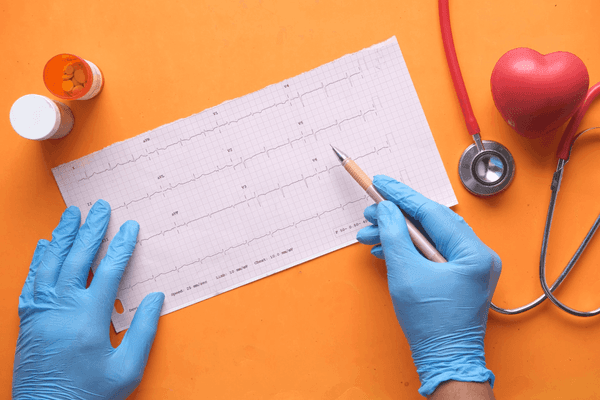![Healthy Matters]() Pharmacist Tips | Dosages | Side effects
Pharmacist Tips | Dosages | Side effects![Healthy Matters]() Nutritionist Tips | Facts | Precautions
Nutritionist Tips | Facts | Precautions![Healthy Matters]() Practitioner Tips | Dosages | Side effects
Practitioner Tips | Dosages | Side effects![Healthy Matters]()
![Healthy Matters]()

Electrocardiogram (ECG) in Hong Kong: A Complete Guide
4 min read

An electrocardiogram (ECG, also called an EKG) is a test to measure the electrical activity of the heart. Despite their similar names, ECG is not the same as echocardiogram, which uses ultrasound to produce images of your heart. While an ECG for medical diagnostic purposes is often carried out in hospitals or clinics, some personal devices such as smartwatches also offer ECG monitoring. Read more to learn how ECG works and what information it can provide.
What is ECG?
Electrical signals are relayed in cardiac cells to stimulate the contraction of the heart muscle. By measuring the electrical activity, the contraction pattern (timing and strength) of the heart muscle can be plotted and the heart rhythm can be observed.
Electrodes (sensors for electrical activity) are essential for capturing the electrical signals across the heart.
12-lead ECG
In a hospital/ clinic setting, a 12-lead ECG system is commonly used. A lead is formed by any pair of electrodes that can measure the electrical potential difference between the two corresponding locations of attachment. 9 electrodes (3 on both arms and left leg + 6 along the horizontal cross-section around the heart) are adhered to your body to measure both frontal and transverse ECG simultaneously.
ECG monitoring in personal devices, e.g. Apple Watch
For personal devices like smartwatches, the number of leads is usually lower for simplicity. Take Apple Watch as an example, it has electrodes on the back of the watch and also the crown. So when you wear the watch on one arm and press your finger (on the other hand) against the crown, it creates a closed circuit between your heart and both arms, capturing the electrical impulses across your chest to generate an ECG that is similar to a single-lead (or Lead I) ECG.
Types of ECG
There are 3 main types of ECG:
- resting ECG – carried out in a comfortable position when you are lying flat
- stress or exercise ECG – carried out while you are riding a stationary bike or running on a treadmill
- ambulatory ECG (sometimes called a Holter monitor) – the electrodes are connected to a small portable device worn around your waist that allows you to monitor your heart at home for one or more days.
Why is ECG used?
An ECG can help detect:
- Arrhythmias – a condition in which the heart beats too slowly, too fast, or irregularly
- Coronary heart disease – A build-up of fatty substances blocks or interrupts the heart's blood supply.
- Myocardial infarction (heart attacks) – where the heart's blood supply is suddenly cut off
- Cardiomyopathy – the thickening or enlargement of the heart walls
And evaluate the outcome of treatment:
- e.g. when a pacemaker is installed to treat a heart disease
You may need an ECG if you have any of the following signs and symptoms:
- Chest pain
- Dizziness, lightheadedness or confusion
- Heart palpitations (suddenly noticeable heartbeats)
- Rapid pulse
- Shortness of breath
- Weakness, fatigue or a decline in the ability to exercise
If your symptoms are prompted by physical activity, an exercise ECG may be indicated; however, if your symptoms are unexpected and occur in random, short episodes, an ambulatory ECG may be more appropriate. Seek medical attention as soon as possible if you experience unusual symptoms.
What should I expect from an ECG?
A typical ECG requires no special preparation.
It's likely that you'll be asked to undress to your waist. If you have very dense hair on the areas of your body where the electrodes will be placed, the care provider may shave it off so the patches can adhere.
During the ECG, electrodes are placed on the chest and limbs. Depending on the types of ECG you are having, you may be lying down or exercising. The electrical signals picked up by the electrodes are recorded by a computer and displayed on the monitor or paper. The process usually takes a few minutes.
Risks of ECG
ECG is a safe procedure. There is no need to worry about electric shocks during the test as the electrodes used do not give out electricity, but only record electrical signals.
When removing the electrodes, you may experience slight discomfort similar to when tearing off a bandage. A minor rash may appear where the patches were applied.
Costs of an ECG in Hong Kong
There are 4 cardiothoracic surgery specialist out-patient clinics in public hospitals. You must present a referral letter from a local registered medical practitioner issued in the last three months to make an appointment. The cost for eligible persons (holder of valid HKID) is HK$135 for the first attendance, $80 per subsequent attendance and $15 per drug item.
Holter ECG is classified as a private service in the public healthcare system and range in price from HK$2,830 to $9,910, depending on the duration of ECG (24-hour, 72 hour or 7-day). Keep in mind that waiting times in the public sector can be extremely long.
In the private sector, you may visit any of the 13 private hospitals in Hong Kong, private clinics or imaging centers for an ECG exam. Based on our research, the cost can range from HK$340 to over $4,400 per examination, depending on the types of ECG performed (resting, exercise, or ambulatory) and the duration (whether Holter monitors are used). ECG is also available as a package, alongside other examinations, e.g. chest X-ray and blood test. Please contact your service provider for the exact pricing and appointments.
Are ECGs covered by insurance in Hong Kong?
ECG costs are reimbursed in Hong Kong when prescribed by a medical doctor and used to make a diagnosis. That being said, most standard local plans in Hong Kong impose an annual limit and depending on how high the costs are, you may have to pay any outstanding amount out-of-pocket. As for high-end medical plans, most cover ECG costs in full without any sub-limit. When reading your health insurance table of benefits, look for the following categories: Diagnostic scans and tests, Brain and Body scans, Diagnostics, or Advanced Medical Imaging. If you have any health insurance questions, contact an Alea advisor at [email protected].
An ECG does not detect blockages. However, it can show if you have possibly had a heart attack in the past which may be caused by blockages.
ECG tests are not painful. The only discomfort you may experience is one similar to tearing off a bandage when the electrodes are removed from your skin surface.
As the electrodes used do not give out electricity, there is no way that the recording machine can give you an electric shock or affect your heart in any way.
This article was independently written by Healthy Matters and is not sponsored. It is informative only and not intended to be a substitute for professional medical advice, diagnosis or treatment. It should not be relied upon for specific medical advice.

Your health resource, made in Hong Kong
Healthy Matters is Hong Kong’s leading health resource. Our mission is to help you make better health decisions and take control of your health.
Our team of experts is committed to producing reliable health content that is accurate, engaging and relevant, to cover your health & wellness journey from prevention to treatment.
Whether you are looking for trusted information on health conditions, wellbeing or looking for the right doctor or service in Hong Kong, we’re here to help!
Your health matters. Begin your health journey with Healthy Matters today!
































